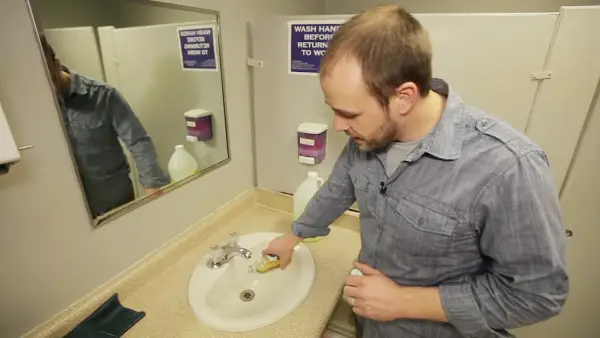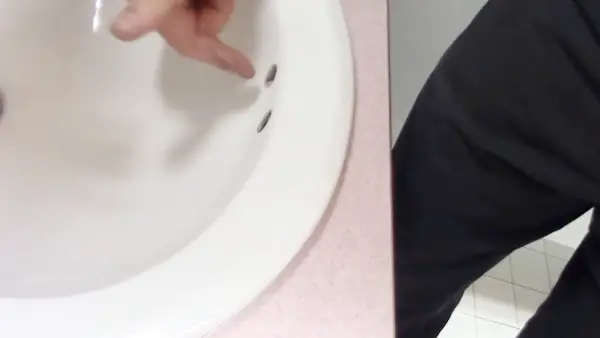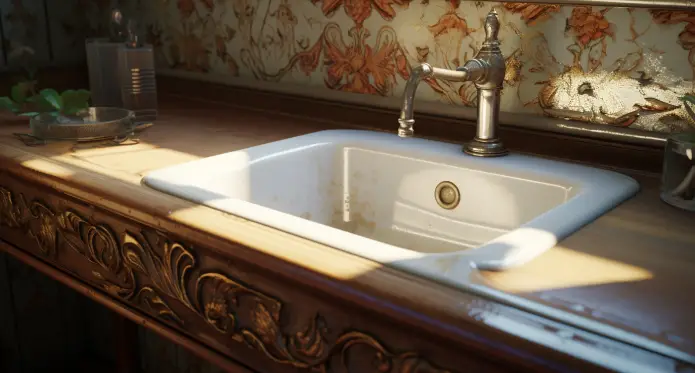Last Updated on November 14, 2023
Stinky bathroom sinks are a common problem in a majority of homes. Although it may seem like a minor inconvenience, the underlying reasons for the odor can harm your health. The odor can be so strong that it is hard to use the bathroom comfortably. But why does it happen, and what can we do about it?
Accumulated hair and soap scum can clog the drain and create a breeding ground for bacteria. Another possibility is a sewer gas backflow, which occurs when the P-trap is dry or damaged. Also, a clogged vent pipe can prevent air circulation and lead to odors.
As part of this article, we will explore why your sink stinks and provide you with effective ways to deodorize it. So, let’s discover the hidden reasons.
Why Does My Bathroom Sink Stink: Possible Reasons With Solutions

Several possible reasons can cause your Bathroom Sink Stink, such as:
- Accumulated hair and soap scum
- Bacterial build-up
- Sewer gas backflow
- Dry p-trap
- Faulty or cracked pipes
Now let’s take a closer look at these reasons and their possible solutions:
1. Accumulated Hair and Soap Scum
If you neglect to clean the accumulated hair and soap scum in your bathroom sink, it will eventually lead to yellowish color and a foul odor. Over time, hair and soap residue can build up in the drain trap, creating an ideal breeding ground for bacteria. These microorganisms decompose organic matter, releasing unpleasant odors.
Regularly clean the drain trap by removing and cleaning the stopper or drain cover to tackle this issue. You can use a drain snake or a mixture of baking soda and vinegar to break down and remove the clogs. Installing a hair catcher or strainer in the drain can prevent future buildups.
2. Bacterial Build-Up
Bacterial build-up in sink drains is a common problem that can lead to unpleasant odors and potential health hazards. With daily use, toothpaste and other waste can accumulate in drains and pipes, creating a perfect breeding ground for bacteria. As this biofilm grows and thickens, it emits an unpleasant smell.
To prevent bacterial build-up in your bathroom sink, regularly clean the sink, drain, and pipes to eliminate the source of the foul odor. Use commercial sink cleaning products.
Keep your bathroom sink and drain clean with an antibacterial cleaner, hydrogen peroxide, and water to prevent bacteria from growing and causing odors. Also, consider using a bacterial drain cleaner to prevent future bacterial build-up and keep your bathroom sink smelling fresh.
3. Sewer Gas Backflow
If you notice a foul smell coming from your bathroom sink, it could be due to sewer gas backflow. Sewer gasses contain toxic compounds like methane and hydrogen sulfide, which can harm your health.
The vent pipe allows sewer gasses to escape and fresh air to enter your plumbing system. When this pipe gets blocked or clogged, sewer gasses can backflow into your bathroom, giving you an unpleasant odor.
To resolve this issue, it’s recommended to consult a professional plumber who can inspect and clear any blockages in the vent pipe. Proper ventilation is also crucial to prevent sewer gas odors from permeating your bathroom. Don’t ignore the vent pipe when troubleshooting the stench in your bathroom sink.
4. Dry P-Trap
The P-trap, a curved U-shaped section of pipe beneath the sink, maintains a water barrier, preventing sewer gasses from entering your bathroom. If the P-trap dries out, it loses effectiveness, allowing unpleasant odors to permeate the room.
You can easily solve the problem of a dry P-trap causing a stinky bathroom sink by running water in the sink to refill it and create a seal against sewer gasses, eliminating the stinky smell.
You can also prevent the P-trap from drying out by periodically pouring a small amount of mineral oil into it, which helps to prevent water from evaporating.
5. Faulty or Cracked Pipes
When pipes in your bathroom sink are faulty or cracked, sewer gasses can escape, causing a stinky odor in your bathroom. Over time, pipes can develop cracks or leaks due to age, corrosion, or pressure.
These damaged pipes allow sewer gasses, such as hydrogen sulfide and methane, to escape into your bathroom instead of being carried away through the plumbing system. These bad gasses have a strong, unpleasant odor, similar to rotten eggs, which can be unpleasant and overwhelming.
To fix this issue, a professional plumber must inspect your plumbing system. They can identify and repair any faulty or cracked pipes, ensuring that the sewer gases are properly contained and don’t cause further odor problems in your bathroom.
How do you deodorize a smelly bathroom sink drain?

To freshen up a stinky bathroom sink drain, run hot water for a few seconds to loosen the debris and flush out any obvious dirt in the bathroom sink drain.
After that, pour one to two cups of baking soda down the drain plug hole. The baking soda will help eliminate the smell and remove leftover water or debris.
Then, add a couple of cups of hot vinegar to the drain. The vinegar will react with the baking soda and foam up. Let it sit for an hour or two to work its magic.
In the end, flush it through using hot water. This simple DIY solution is cost-effective, safe, and easy, leaving your bathroom smelling fresh and inviting.
Will bleach help a smelly bathroom sink drain?
Bleach is effective in killing the majority of odor-causing bacteria that reside in the drain. These bacteria are responsible for the foul smell emanating from your sink. By using bleach, you can eliminate these bacteria and their accompanying odor.
Simply pour some bleach down the drain and let it sit for a few minutes. Then, flush the drain with hot water to rinse away the bleach and any remaining bacteria.
However, it should be noted that bleach should be used sparingly and with caution, as it can be a harsh chemical. It’s also advisable to ventilate the area using bleach to avoid inhaling its fumes.
Eliminate Awful Bathroom Sink Stink Completely
An unpleasant smell emanating from your bathroom sink can be an utter annoyance. Potential causes for bathroom sink odors can vary from clogged pipes to bacterial build-ups to dry P-traps.
It’s not only a mere inconvenience but can also be hazardous to your health. The best course of action is to understand the underlying reasons for the stink, implement the solutions, and ensure the issue doesn’t happen again.
So, implement any solutions mentioned above if you’re dealing with a funky bathroom sink odor and get rid of it for good.

